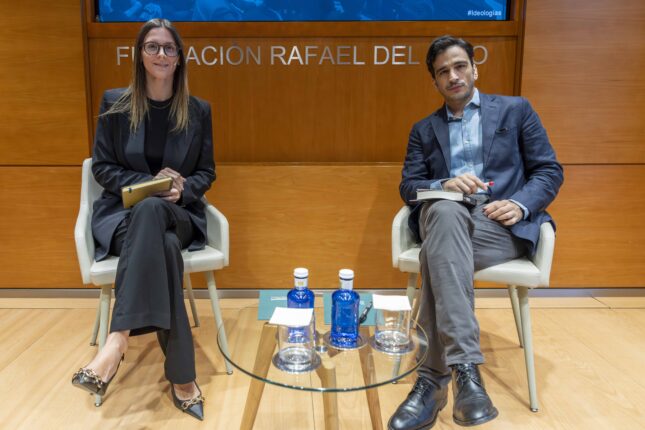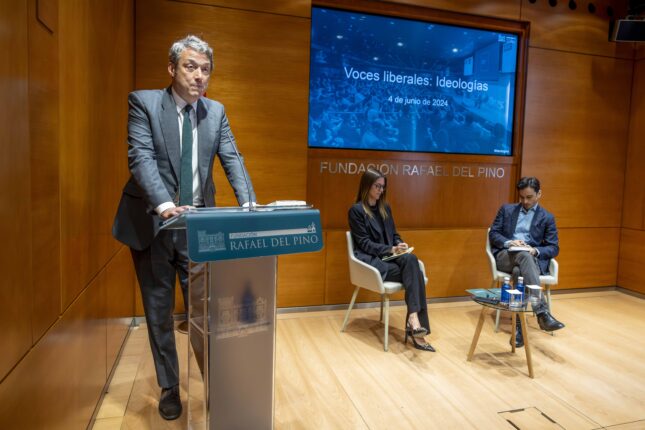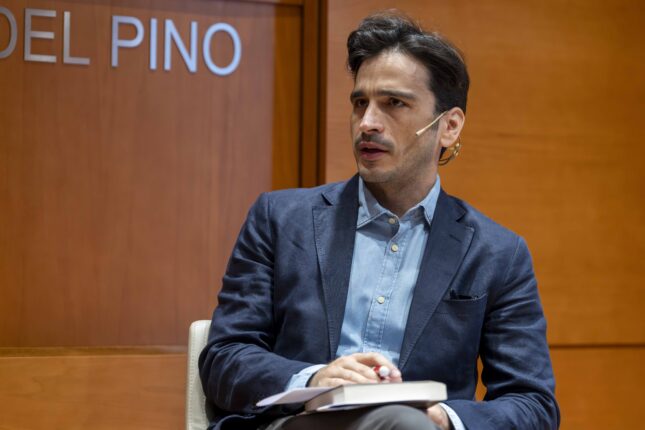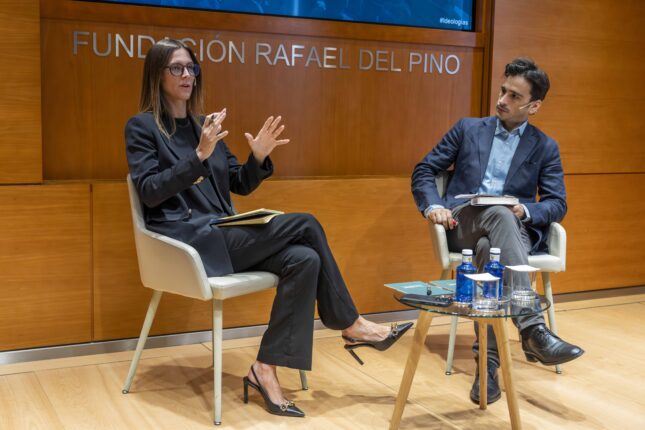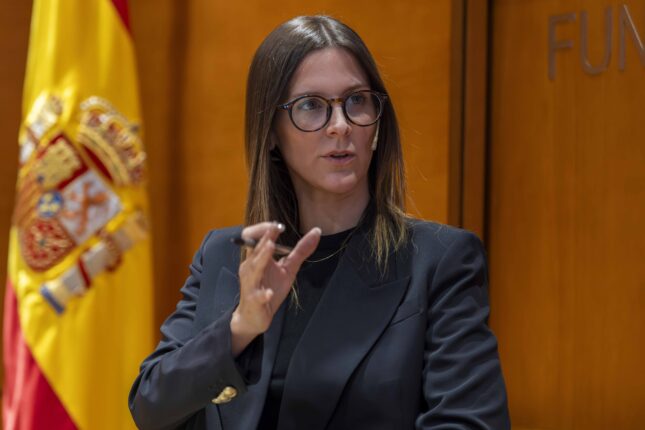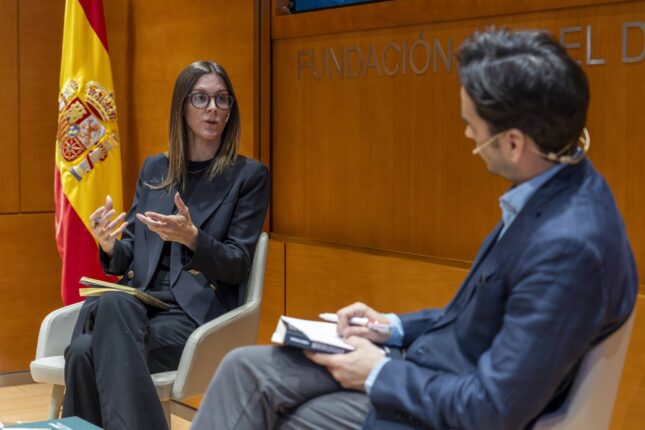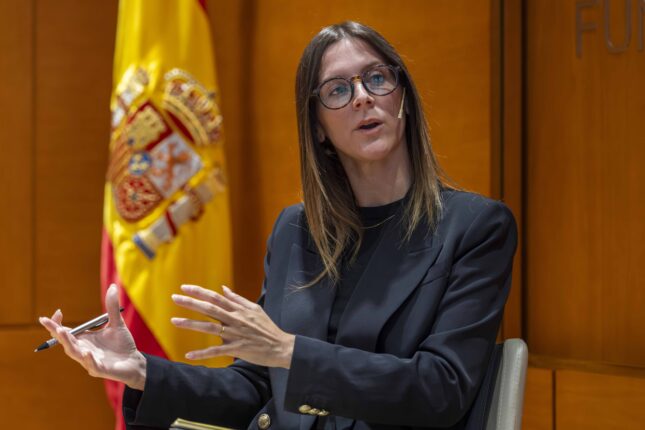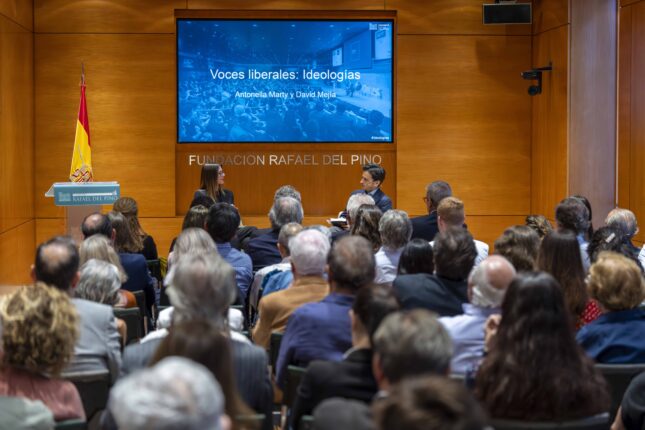Antonella Marty and David Mejía
Summary:
On 4 June 2024, the Rafael del Pino Foundation organised the dialogue "Liberal Voices: Ideologies. Political ideas that move the world", with the participation of Antonella Marty, Argentinian political scientist and host of the podcast "Let's Talk Freedom", and David Mejía, Professor of Philosophy and Humanities at IE University.
There is a disorder of ideas, where many are identified with things they are not, for example, liberalism, wrongly identified with nationalism. We are not only governed by the law, but also by the ideology that interprets the law, the form of government, public policy. We are facing a crisis of ideas.
I don't consider Milei a liberal, neither do his facts. When you go to the government policies that are being taken, such as tax increases, 300% inflation, 55% poverty. Beyond that, the sort of attack on political freedom, because in Javier Milei there is a messianic figure, he is a teenager who governs to satisfy a series of personal whims seeking the approval of other political leaders. We can see this in the series of international trips he is making. He is a right-wing populist and right-wing populism generates a lot of confusion in political communication. And there is a kind of fight between political leaders to see who gets more likes, who offends more or who divides society more and more. There is a kind of competition to see who can best use this political communication strategy, the consequences of which are then paid for by the people in a polarised society. Populism is one of the great politicians today, as a mechanism to mobilise emotions, to present oneself as a messiah, associating liberalism with religion, when liberalism was born to separate religion from power. A kind of liberalism without freedom has been created.
Donald Trump would be in the same vein. Moreover, the United States has taken a very dangerous drift. The Republican Party itself today is practically unrecognisable, even the visions that have emerged within the party, such as Christian nationalism, when the United States was the first country to have a secular religion. Even the founding fathers spoke of religious freedom and even that religious freedom means that one can have no religion. On 6 January, in the seizure of the capitol, you saw it again. There is a destruction of democracy and a need on the part of these caudillos to create phantoms all the time, like the idea of global communism. Fidel or Maduro don't talk about dictatorship of the proletariat; they talk about fatherland or death, which is quite similar to the message of parties like Vox or the Republican party in the United States, where we see this resurgence of a populist nationalism that we should have learned a lot from in the last century. That explains to us that we are not safe from the ideas of the past and why democracy must be defended. Donald Trump, obviously, is one of those attacking democracy, Victor Orban too, manipulating the idea of democracy.
What is unexpected in all this is what has happened to liberalism, because today it is associated with concepts that are totally antithetical to the concept. Here we enter into this idea of the West, which is part of the narrative of many right-wing populists. Liberalism was born in the West as an antibody, trying to solve the problem of the West of the Middle Ages, the Crusades, the Inquisition, the West before the Enlightenment, which is the West to which many politicians today seek to return. They point to the vision of the nostalgic past. That also connects to the idea of power. This strange linkage that has been made today, with a religious vision, of liberalism, is largely due to an infiltration of conservatism, of anarcho-capitalism, all these qualifications, and this has infiltrated what was understood as liberalism and today there is liberalism without freedom. Milei, the person who speaks of freedom and liberalism, who does so in the name of those forces of heaven that he speaks of, like his dog Conan, has to worry because he is governing a country in crisis. There is a disconnect between Milei and reality. He is living his moment.
The first aspects of the toxic power-religion relationship is connected by the idea of cultural battle. It is a contradiction in terms because a battle is a war concept and culture is a spontaneous order. Cultures do not battle. What they are trying to do is to talk about a supposed debate of ideas when, in reality, there is no interest either in the debate or in culture. There is a specific interest in establishing a specific, punctual model of life from the magazines of the 50s, without taking into account all the liberation movements of the 60s and 70s. It is a morality that today is once again trying to regain this ground in the name of right-wing populism. Terms such as the moral majority are once again presenting this fear and mobilising the mentality of the tribe and the fear of the other, of what is different, of something that could jeopardise things as they are understood. It becomes movements, like sects. It happens with ideologies, it even happens with liberalism, where everything that is not liberal is expelled, anyone who carries out the task that a liberal should do, which is to question things, which is to propose critical thinking, not to fall into the siren song of these messianic leaders. This is another aspect, because populisms are permanently twinned, that of the left and that of the right. The answer to what is happening now will emerge at some point. We are in a very important crisis of ideas. We have to humanise them, bring in issues such as empathy, links with others, understand the aspect of humility and come down to reality. When we realise that we are in a small point in the galaxy, nationalism, racism, all these things that are used by these messiahs who seek a moment of glory in a place as ephemeral, in an existence as brief as the human one, fall away. Why are we going to be telling others how to live their lives? Why are we going to be dividing society? There is the aspect of purity, the relationship of right-wing populism with the idea of purity, as supremacy achieves. It brings back the idea of purity and purity is achieved through the cultural battle. We enter into a circle that, when we identify it, we can have clearer ideas.
Asking questions is a response to this, getting out of the environment in which you are comfortable, which brings you down a line of which questions should be asked and which should not. There is a tendency in human beings to become part of a tribe and a tendency for politicians to lead us to this because today it serves their purposes, to make politics, to resort to populism. A lot happens through education, through what is learned at home. There are children's rights, for example, bullying. You grow up in an environment as a child. The bully as a child then grows up and can become a politician and make decisions for others. The person who has been bullied is scarred. Another case is conversion therapies, another issue that needs to be brought into the debate, because they still exist. Another issue when talking about children's rights is to what extent religious education, the imposition of a religious model from childhood, does not violate your free personality development as a human being. There is a serious problem there, because how do you take care of children from environments that can limit their conscience, the voice that every person has inside.
At different moments in history, different thinkers share certain social struggles, or issues that have to do, for example, with women's rights, the liberation of the 60s and 70s. In a world in which ideas were being shaped, throughout the last century too, born at different times, they touch on certain issues, although they are different ideologies, with very different proposals.
The idea of anarcho-capitalism today represents a struggle against the rule of law, a struggle against the rights of minorities, against those who want to defend themselves against other groups that have historically attacked them.
Another issue is the much talked about right to offend. There is no right to offend others. The worst thing is that this is done in the name of the right to freedom of expression. There is a great deal of confusion here, because freedom of expression is not bullying, it is not distilling hate speech, which ends up in suicides, genocides, persecution of different groups of people. Many politicians, with influencers and academics, carry out these hate speeches, in the name of freedom of expression, and then they are surprised when they cancel them and end up presenting themselves as victims, when we are not seeing who the real victim of all this is.
If there was more empathy in society, these things would not be happening. There are many debates that are still pending. Whenever someone exposes a problem there may be someone who says it's not a problem because it's in their interest to keep things as they are. One cancels all the time. We have to see from which position we see the idea of cancellation, for example, with whom we invite to our house. It is a kind of personal justice. There are people in politics who try to vindicate these mechanisms of division of society and then complain that they are cancelled. But we have to look beyond that and think about the victims. We must consider a way of thinking, of seeing the other, and be able to put an end to these segregations, violence, mechanisms, and not minimise them. We must listen to the other and feed off this dialogue. We have civilised debates and, on the other hand, people who want to impose a certain way of life on you, and they do it through a cultural battle.
The Rafael del Pino Foundation is not responsible for the comments, opinions or statements made by the people who participate in its activities and which are expressed as a result of their inalienable right to freedom of expression and under their sole responsibility. The contents included in the summary of this conference are the result of the debates held at the meeting held for this purpose at the Foundation and are the responsibility of their authors.
The Rafael del Pino Foundation is not responsible for any comments, opinions or statements made by third parties. In this respect, the FRP is not obliged to monitor the views expressed by such third parties who participate in its activities and which are expressed as a result of their inalienable right to freedom of expression and under their own responsibility. The contents included in the summary of this conference are the result of the discussions that took place during the conference organised for this purpose at the Foundation and are the sole responsibility of its authors.
